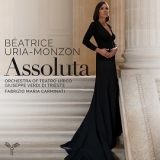 Cilea: Io son l’umile ancella (Adriana Lecouvreur); Puccini: Vissi d’arte (Tosca) + Sola, perduta, abbandonata (Manon Lescaut), Senza mamma (Suor Angelica); Mascagni: Voi lo sapete, o mamma (Cavalleria rusticana); Giordano: La mamma morta (Andrea Chénier); Ponchielli: Suicidio!; Bellini: Casta Diva (Norma); Verdi: Nel dì della vittoria.. Vieni t’affretta! + Una macchia è qui tuttora! (Macbeth) + Pace, pace mio Dio (La forza del destino); Béatrice Uria-Monzon, Orchestra della Fondazione Teatro Lirico Giuseppe Verdi di Trieste, Fabrizio Carminati; 1 CD Aparté AP221; Aufnahme 06/2019, Veröffentlichung 28.05.2021 (58') - Rezension von Remy Franck
Cilea: Io son l’umile ancella (Adriana Lecouvreur); Puccini: Vissi d’arte (Tosca) + Sola, perduta, abbandonata (Manon Lescaut), Senza mamma (Suor Angelica); Mascagni: Voi lo sapete, o mamma (Cavalleria rusticana); Giordano: La mamma morta (Andrea Chénier); Ponchielli: Suicidio!; Bellini: Casta Diva (Norma); Verdi: Nel dì della vittoria.. Vieni t’affretta! + Una macchia è qui tuttora! (Macbeth) + Pace, pace mio Dio (La forza del destino); Béatrice Uria-Monzon, Orchestra della Fondazione Teatro Lirico Giuseppe Verdi di Trieste, Fabrizio Carminati; 1 CD Aparté AP221; Aufnahme 06/2019, Veröffentlichung 28.05.2021 (58') - Rezension von Remy Franck
Früher als Mezzosopran angekündigt, firmiert die 57-jährige Französin Béatrice Uria-Monzon jetzt als Sopran. Dennoch würde ich ihre Stimme, trotz ansehnlicher Sopran-Höhe doch eher als Mezzo bezeichnen. Doch das sei noch einmal dahingestellt. Das Schlimme an dieser CD ist die Usurpierung eines Titels.
Assoluta ist heute gewissermaßen Synonym für Maria Callas. Und das, was wir auf dieser CD hören, ist Lichtjahre von dem entfernt, was Callas in diesem Repertoire leistete.
Uria-Monzon singt aber genau das Repertoire der Callas und muss sich daher auch an ihr messen lassen. Und dabei schneidet sie sehr schlecht ab, ohne wirklich schlecht zu singen (aber auch nicht wirklich gut). Aber der provozierte Vergleich zeigt, dass Callas Uria-Monzon doch immer noch weit voraus ist, wenn es um die dramatische Darstellung, um die Inkarnation geht. Doch eine dramatische Wirkung kann man der Sängerin nicht völlig absprechen.
Stimmlich ist die Höhe noch das Beste, auch wenn die Stimme unter Druck schon mal ausfranst, die Farben ins Weiße kehren und mancher Spitzenton unschön spreizt oder im Gegenteil rasierklingenscharf und daher zu eng wird. Im oberen Register stört oft ein Glaspapiereffekt. Das Abdunkeln und Verbreitern der Mittellage lässt diese oft hohl, matt und ausdrucksarm klingen, während die kräftige Tiefe oft nicht zu den Sopranarien passt, die auf dem Programm stehen. Hin und wieder, z. B. in der Casta Diva-Arie, machen sich die Unausgeglichenheit der Vokalführung und ein leichtes Flackern unangenehm bemerkbar. Das führt zu einem zähen Vortrag mit einer zudem auch mangelhaften Artikulierung und ständigen Verfärbungen der Vokale, wobei ‘a’ und ‘o’ meistens gleich und irgendwo zwischen beiden Vokalen klingen. Die Liste der Mängel ließe sich fortsetzen, und so kann ich dieses Recital wirklich nicht empfehlen.
Formerly announced as a mezzo-soprano, the 57-year-old French singer Béatrice Uria-Monzon now trades as a soprano. Nevertheless, I would rather describe her voice as a mezzo, despite her respectable soprano high notes. But that is not the main point here. The really bad thing about this CD is the usurpation of a title.
Assoluta is today, so to speak, synonymous with Maria Callas. And what we hear on this CD is light years away from what Callas accomplished in this repertoire.
Uria-Monzon, however, sings exactly Callas’ repertoire and must therefore be measured against her. And she performs very badly, without singing really badly (but not really well either). The provoked comparison shows that Callas is still far ahead of Uria-Monzon when it comes to dramatic performance, to incarnation.
But one cannot completely deny the singer a dramatic effect.
Vocally, the high register is still the best, even if the voice sometimes frays under pressure, the colors turn into whiteness and some top notes spread unattractively, or become razor-sharp and therefore too narrow. In the upper register, a glass-paper effect often disturbs. The darkening and broadening of the middle register often makes it sound hollow, dull and lacking in expression, while the powerful depth often does not suit the soprano arias on the program. Now and then, for example in the Casta Diva aria, the unsteady vocal line and a slight flickering become very unpleasant. This leads to an inelegant performance with, moreover, also poor articulation and constant discoloration of the vowels (with ‘a’ and ‘o’ sounding mostly the same and somewhere between the two vowels). The list of shortcomings could be continued, and so I really cannot recommend this recital.
























